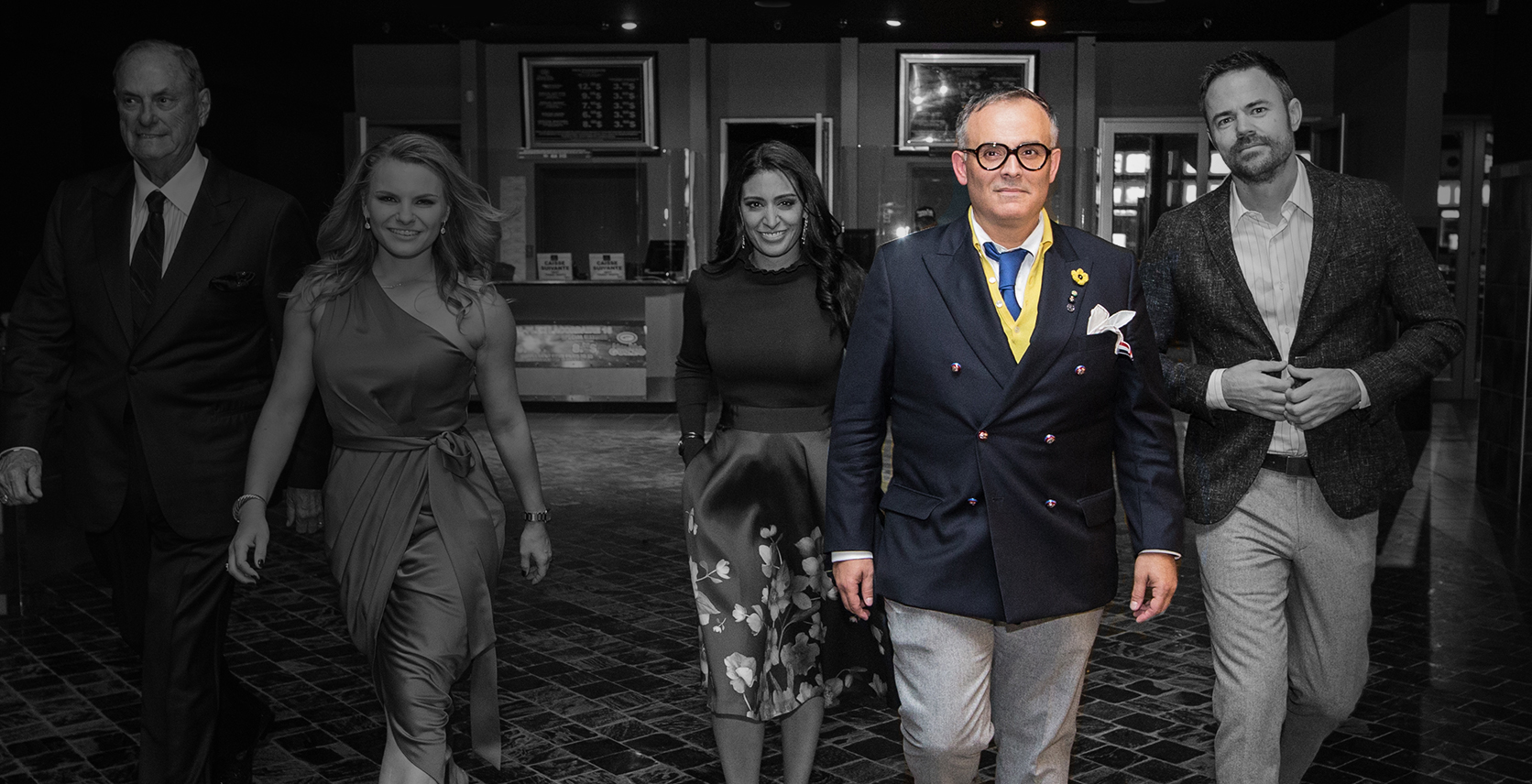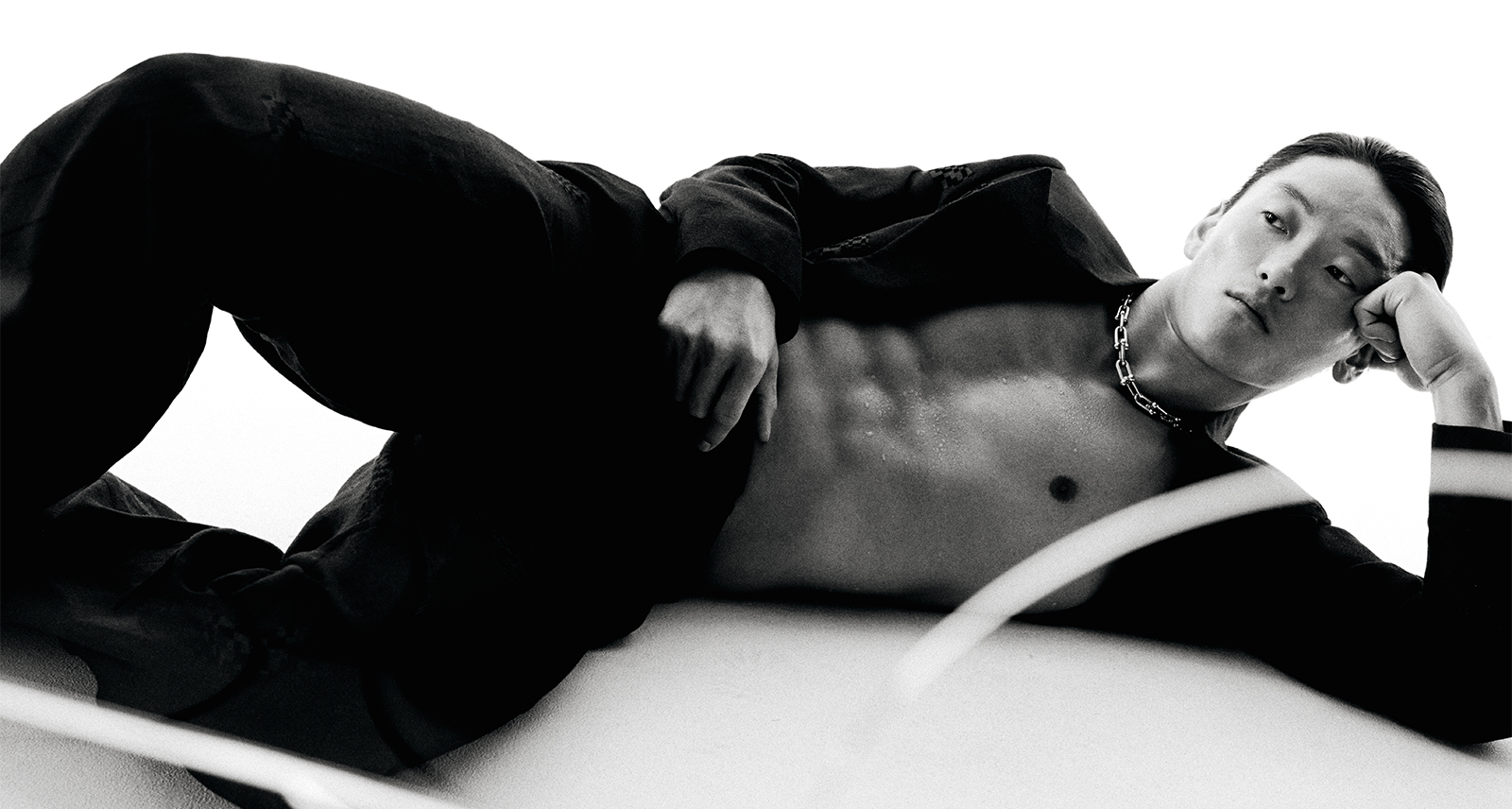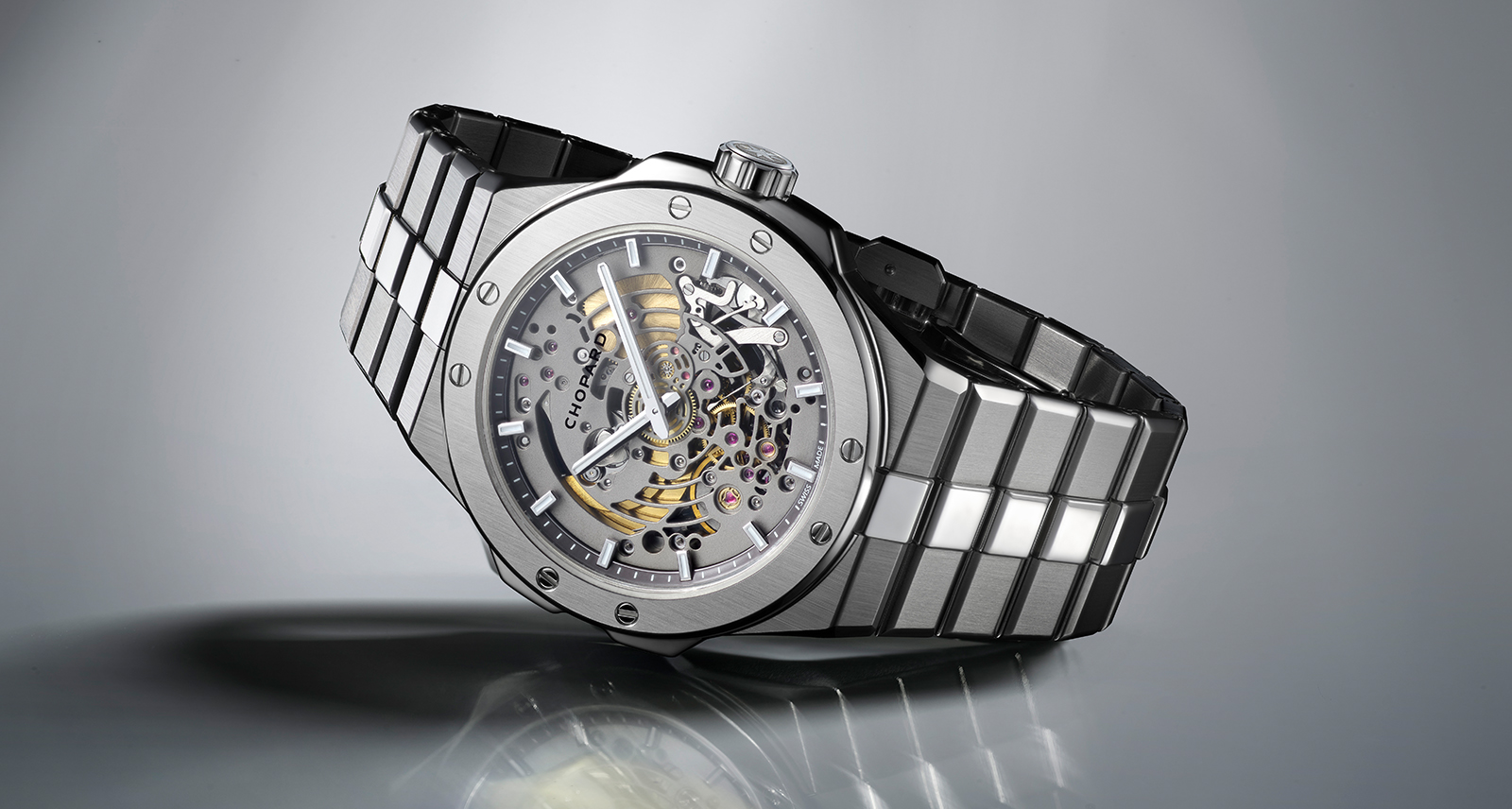‘Dragons’ Den’ Entrepreneur Vince Guzzo Is a Big Bowl of Sunshine
Vince Guzzo doesn’t know much about keeping a low profile. The Cinemas Guzzo CEO-turned-Dragons’ Den star has many new, high-key ventures up his sleeve. In addition to expanding the Guzzo enterprise from the movie business to the hospitality, food, medical, and construction sectors, he’s also working on turning himself into a #brand.
Guzzo also has a hard time keeping things on the down-low on social media; he often claps back at “haters” on Twitter. Love him or hate him, he most definitely deserves respect for his self-described “no bullshit honesty.” With his name plastered all over Montreal, and his face on your TV screen, it’s hard to ignore him.
Turns out Guzzo is much the same IRL. During my freewheeling chat with “Mr. Sunshine,” he spilled the tea on his fellow Dragons, which promising pitches turned into nightmares, and, uh, why Adam Sandler is only getting gigs from Netflix.
Do you prefer Vince or Mr. Sunshine?
Well, it all depends. I mean, in your case, you can call me Mr. Sunshine. But once we become really good friends, you can call me Vince.
When did you start going by Mr. Sunshine?
People used to call me two things. They used to call me either ‘Mr. Sunshine’ or they used to call me ‘Beast’. And in both cases, it referred to the mood I was in that day. So, the ‘Mr. Sunshine’ was normally when I walked into a meeting — I was going to do a deal or something. So everybody thought if he’s smiling, he’s happy; the whole room seems to be glowing because he’s in a good mood. And then by the end of the deal when we’d leave, if I overly took advantage of the business situation, normally my professionals would say, “Jesus man, you’re a beast! Like, my God, I can’t believe how you damaged this whole negotiation and now you sort of got the best of the whole outcome.” You have to remember that most of my deals back in the days where these nicknames started coming up were when I was the smaller guy negotiating against the bigger guy. Today on Dragons’ Den it’s a bit of the opposite, right? So I’m seen as the one in a position of power against a pitcher who has less say. But back in my day, I was negotiating against Hollywood executives who could just say no.
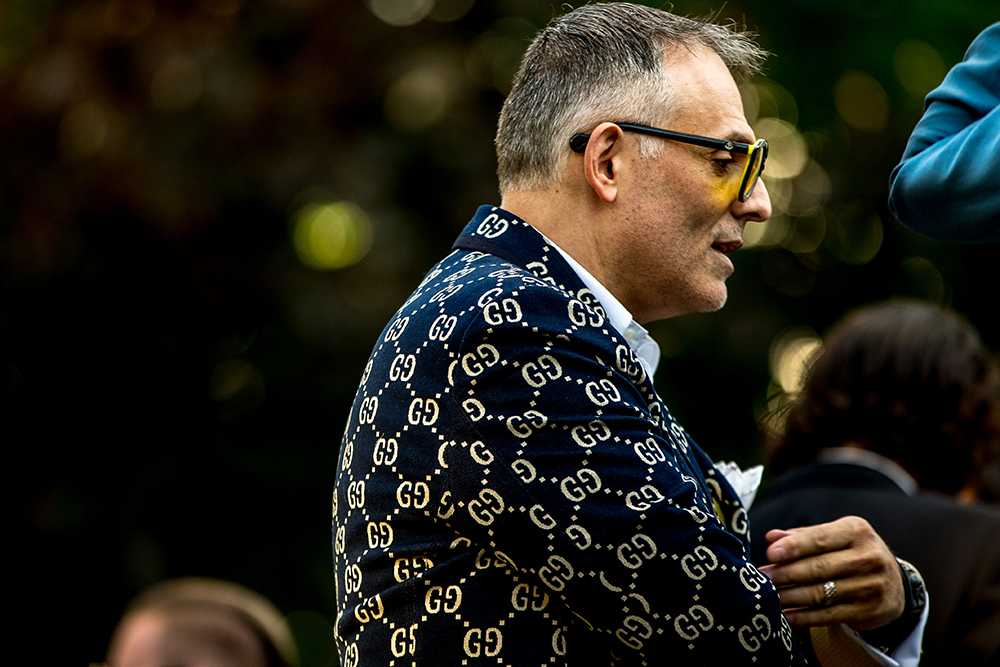
What’s it like being a Dragon?
It’s really fun. It’s rewarding on a professional basis. Having met people like Jim [Treliving] — I knew of Jim from when he was on Dragons’ Den and stuff, so I knew of him and Boston Pizza before he knew of my existence. It’s also rewarding to have these discussions with a guy like Jim who’s a bit like me, even though he’s 28 years older than I am. He’s a brick and mortar guy. He’s not one of these I.T. guys like Lane [Merrifield], for example, who came up with an amazing idea and built it and, basically, for all intents and purposes, cashed out. Jim made his money probably over 50 years time. My dad and I did it the same way. Every dollar was earned and it wasn’t like a great idea and here’s a $500 million cheque kind of thing. Getting to meet Michelle [Romanow] was great because she gave me a different perspective on some of the I.T. deals — though I still don’t 100 per cent understand how sometimes they come to these crazy valuations on these IP companies, just because they have a million followers and it’s worth God knows what and I’m sitting there going, “I’m not getting it.” Today you have a million followers, tomorrow you don’t. And if you were to upkeep that list you’ll realize that you don’t have a million followers — some of them are gone and they’re not coming back; they just didn’t close the account.
Ultimately, the thing that it’s done is it’s really upped my profile. I walk or I eat and I’m happy to see that most of the people will recognize me. It’s really funny because everybody tries to portray CBC as having an older demographic, but in reality, what’s really strange is that most of the people that actually recognize me or want a selfie are usually under 25. So I went to Western to give a talk and it was amazing. I mean, there was a room full of 200 kids and everybody knew who I was! I would tell you the only negative is probably the negative reaction that some people may have — they’re more extremist than they used to be. If somebody didn’t like me, they would say, “I really don’t like you” and now they give you three paragraphs worth of insults and you’re sitting there like, “Geez, really? Seriously? Like, you took the time to write three paragraphs about this? Wow. I’m impressed.” That’s the only negative. My wife would probably add a few more…
“I’m going to tell you what I think. You may not like it but I’m going to tell you anyway. That kind of approach has made me a lot of short-term enemies. But at the end, it made me a lot of long-term friends.”
What was the best pitch you’ve heard in the Den?
One of the really good pitches that I liked, but I really didn’t like dealing with the people afterwards, was episode one, I believe. It was the gold extraction pitch. Basically, it was a guy with two professors from the University of Saskatchewan, and they basically had a patent on how to extract gold from cell phones and electronics. So it was a sort of recycling instead of having to burn the plastic at certain temperatures, so the plastic evaporates but the gold remains. They found a greener way of doing it. I really liked that pitch to the point that I got up, which is very rare that anybody gets up on Dragons’ Den, and I literally went to talk to all of the Dragons and then we made the offer and we got the deal.
But one of the issues sometimes when we do these deals is that we we need to evaluate you in roughly 45 minutes, even though they edit that pitch down to about 10 minutes, and you’re probably on your best behaviour and we’re trying to determine how much of a pain in the butt you will be or how manageable you are or how teachable are you? And in this case, what basically happened is literally the day after we did that deal, the guy basically hired himself a CFO who, for all intents and purposes, today probably has stolen control of that company away from the guy doing the pitch. So for us it was a living nightmare, trying to close that deal, which we never did close. All of a sudden, almost everything was off the table.
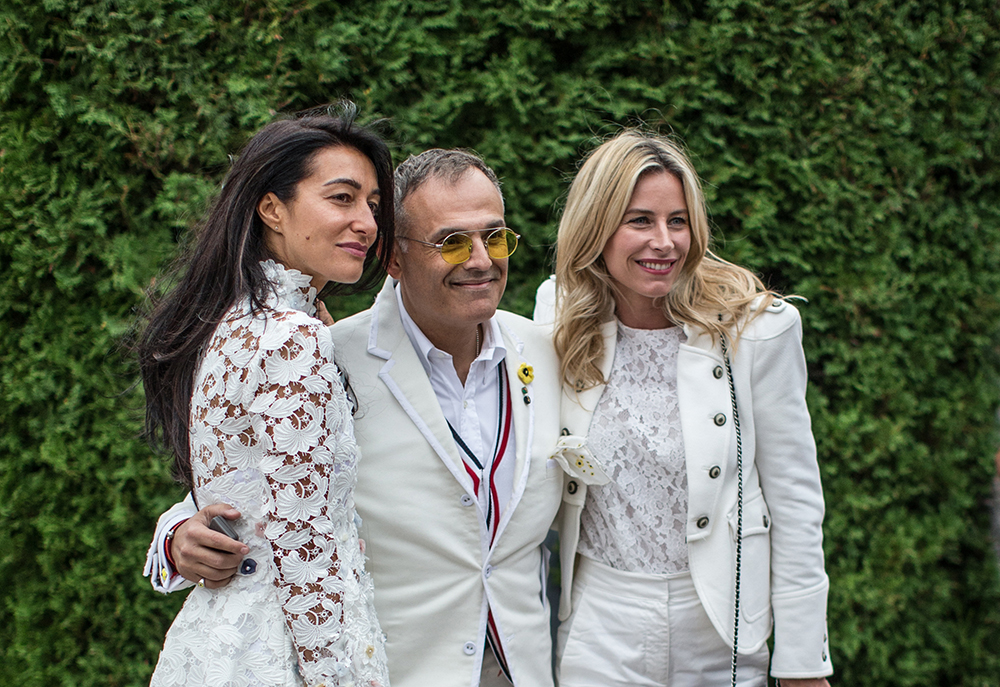
What’s the one mistake most pitchers make?
Most people seem to not remember that we actually made money. We went probably through the same process they did. As far as I know, there’s none of us on the Den that has inherited money. So we made the money and they seem to forget that if they’re there, we know the chances are very high that they’ve pretty much expired and exasperated all of their friends and family money. We know that they’re probably not getting what they want from banking institutions and therefore they’re now at stage three, which is, “I’ve got to give up part of my business to see it build more.” Some of them are looking for mentorship; some of them are looking to learn. Yet many of them come with this thing almost like, I’m going to sell you on this idea but I don’t want you to realize that I need you more than you need this product. But that’s a fact. I must get at least 100 emails a week for venture capital things or for investing here or there. I mean, I’ve got a full-time team of six looking at all these deals on a continuous basis. So we know the game and we know it very well. And, in fact, what a lot of people seem to forget is it’s got to be enjoyable for us. Meaning, if I’m going to do a deal with you, it cannot only be about the product, it can’t only be about you. I’ve got to have fun doing this because as I like to say to people, you know, I turned 50 this year. What do I have left on life expectancy? You know, just average life expectancy? Twenty-five good years? I may have wasted part of the first 50, I ain’t wasting the next 25. I’m going to have fun doing what I do.
If you’re one of those miserable pitchers who thinks you’re going to take my money and tell me to go to hell because you know everything…it just doesn’t work. Sometimes I’m polite about it and sometimes I’m not. There was a pitcher last year about to leave; he thought he was the Peloton of rowing, and while the idea wasn’t a bad one, I think it was the arrogance of that pitcher that made his deal go flat. When a 26-year-old tells you, “Well, I poured a lifetime of work in this,” it’s like, you’re kidding me right? A lifetime of work at 26 years old? It’s a joke! Those are the things that people seem to forget and that hurts them a lot.
So I noticed on your website that you’re creating a limited edition Mr. Sunshine bear. You’ve really turned yourself into a brand. I know you have other personalized luxury merchandise as well, but what made you decide to turn yourself into this type of brand?
I’m a big fan of the branding business. If you notice on the show, my clothes are Thom Browne clothing. So I love the brand. One of my favourite brands of all time is probably Ralph Lauren and what happens over time is brands are associated first and foremost not to their products but to the people behind the brand. So a brand like, for example, Versace — as long as Gianni was alive, it was an amazing brand. Everybody knows it was a cool brand. Same thing with Valentino, same thing with Armani. So for me, you know, I’m saying to myself, Well, everybody knows Vince Guzzo in the province of Quebec. Now everybody’s starting to hear about this guy Vince Guzzo in the rest of the country. I was in Northern Italy when some German guy was walking near me and says, “I know you from somewhere.” I say, “Sorry, I don’t know. I’m from Canada.” He says, “I’m Munich, Germany.” Ok, we talked a bit, whatever. When I got up and I went to the bathroom and he saw my jeans, there was a huge patch on my pocket. It was a “Mr. Sunshine” patch. He says. “That’s who you are!” I go, “What are you talking about?” He says, “I saw you on Netflix!”
So ultimately, for me, the whole Mr. Sunshine thing and everything that I’m trying to do with it is develop a fun lifestyle brand behind it. You know, Cinemas Guzzo has the Guzzo name all over every building anyway. All of our other ventures all have my last name in it. We have Guzzo Medical, Guzzo Hospitality, even our pizzeria is called Giulietta Pizzeria Napoletana by Guzzo Hospitality. We always put it there. So to add to Mr. Sunshine and a sense of creating a brand behind it, it’s because it’s fun. It’s about having fun and you have to remember that. That’s how some of the most interesting and valued brands in the world started. People could wear your clothes, and it becomes representative of the lifestyle that you think is important. And if there’s anything that Mr. Sunshine stands for, it’s basically just “no bullshit honesty.” I’m going to tell you what I think. You may not like it but I’m going to tell you anyway. That kind of approach has made me a lot of short-term enemies. But at the end, it made me a lot of long-term friends.
Is “listen to me” your signature catchphrase? How and when did that start?
That is my catchphrase. And we’ve also used it in our mental health initiatives. You know, when we do our white party or Notte in Bianco that we do every year for mental health and for hospitals, the slogan is #ListenToMe. And that comes from the fact that many times I would go into business meetings, I would express what I was looking for and the other person would try and sell me on something else and then I would repeat what I wanted. And then that person would continue trying to sell me something and I then normally get upset when, in a business context, I say to people, “Okay. Listen to me.” That’s usually a pre-warning of you either smarten up or get the frig out of my office. You know, it’s not a like a nice “listen to me.”
I remember there was a movie called Listen to Me, which was very good, and it was about debaters. You know, a typical American movie during the Breakfast Club craze of movies and the guy basically — I don’t know if he died or he killed himself or whatever in the process because his dad was pressuring him to become a politician. And he was a debater, so the whole movie was all about “listen to me, listen to the youth.” So I took a bit of that slogan. I said, “Listen to me, because you’re going to upset me.” And when I say on the show, “Okay, listen to me,” it’s because you upset me now because you’ve already brought me to a point where I want to tell you to go to hell, so I’m going to be nice, so listen to me, answer the question or start reasoning logically.
Has the rise of streaming services like Netflix affected your movie theatre business at all?
It has. But not in the way people think it has. What’s really happened is three things occurred simultaneously that seemed to have created a very toxic environment for movie theatres. So the first problem is back in the pre-’90s, studios would release about five pictures a year, not more than that. Then VHS started, and then DVD, and all of a sudden, that created a $5-billion business that generated so much cash that people were making all kinds of movies. The horrible ones were going straight to video, the so-so movies were going straight to TV, and the amazing ones would go to the movie theatres. But some guy came up with a genius idea and said, “Why don’t we give movie theatres every single goddamn movie we make? You release it for us.” And so we did that. The problem is consumers started saying to themselves, “Okay wait up. Just because a movie’s in theatres now, doesn’t mean it’s theatre-quality.” At the same time as that’s happening, Enron gets caught putting toilet paper at 50 bucks a roll on its book of assets. So the auditors of the world started annoying everybody by trying to get a better idea of what assets were worth. And one of the places where there were questionable assets was in the movie business.
Basically they went to L.A. and said, “Why is your movie library worth 5 billion bucks?” You haven’t made a penny off Gone with the Wind in the last 20 years. That’s when Netflix comes out of the woodwork with this idea of streaming, and they offer $100 million dollars to some studios to have access to their library for 10 years. So all of the studio guys were happier and were like, “We now have an answer to our auditors. This is worth at least a billion bucks.” The real consequence of what happened is Netflix is created, but nobody thought it would hurt the DVD market to the point that it annihilated Blockbuster and all of a sudden, you’re $5 billion out of pocket as a studio.
And so, streaming services allow people to demand more from movie theatres based on Netflix’s original content. Not on their movies, though, because their movies are horrible. When has Adam Sandler made money in movies in the last 15 years? He hasn’t. Why is he on Netflix? Because they’re the only guys still willing to pay Adam Sandler to make a movie. Jennifer Aniston — when has she ever made any money in movies? Never. Netflix has become an amazing retirement home for all the has-beens of Hollywood and that’s great. But what works on Netflix are the series’ that if they made movies like that, they’d work in theatres. So the drop in attendance in theatres is really because Netflix is making TV series that put customers in a position where they’re saying, “If this is what I’m getting on TV for free, then why pay for a movie ticket?” Because people seem to forget they’re paying $10.99 a month. So they’re saying, “Well, if I’m going have to pay 12 bucks I’m going to expect at least this.” That’s where it’s altered the perception of people.
